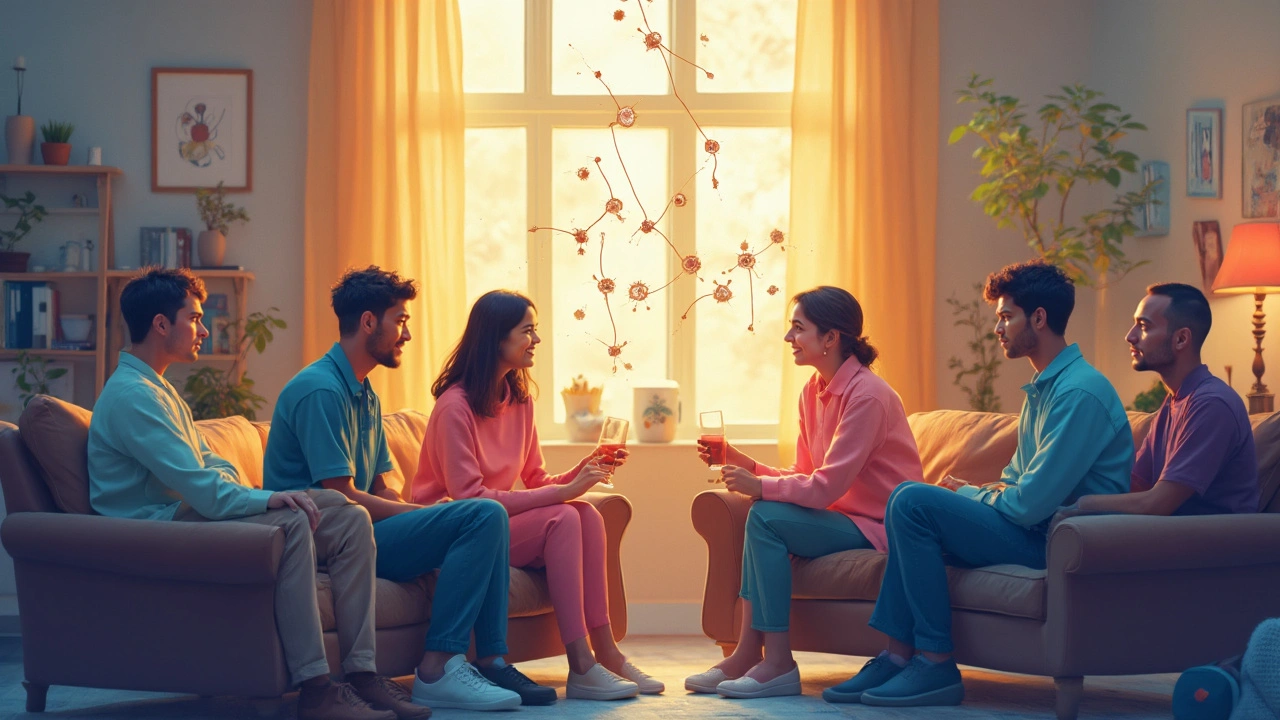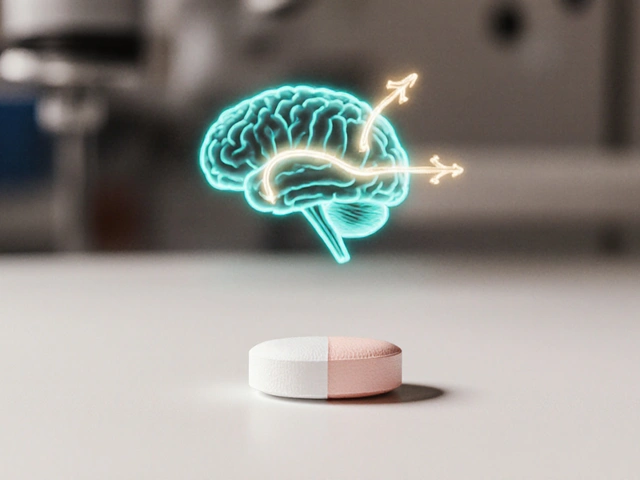
People talk about hangovers like they're the main problem with drinking, but that's not even close. What sneaks up on you is how regular heavy drinking messes with your brain, not just short-term, but for the long haul. I'm talking about issues like forgetting simple things, taking longer to make decisions, or struggling to focus at work. These aren't just random bad days—it's your brain literally rewiring because of alcohol abuse.
Most folks have no clue they’re slipping until someone else points it out—like a partner wondering why you keep repeating yourself, or a boss getting frustrated you’re not as sharp as before. These aren't just embarrassing moments; they're signals that alcohol dependence is already making changes inside your head. And the scariest part? The damage can sneak up over years, not just months.
- How Alcohol Changes the Brain Over Time
- Everyday Signs of Cognitive Decline You Might Miss
- Is Recovery Possible? What Improves If You Quit
- Tips for Protecting Your Brain—Even After Dependence
How Alcohol Changes the Brain Over Time
When you drink too much, especially over months or years, alcohol dependence messes with your brain’s wiring—literally. Instead of just making you tipsy or forgetful for a night, heavy drinking starts killing off brain cells and shrinking important areas, like your frontal lobe. This is the part that makes you good at planning, controlling impulses, and making smart choices. It’s no surprise people with years of dependence struggle to focus, remember, or stay organized.
Brains like things in balance. But alcohol messes with the chemicals that help your nerves talk to each other. The more you drink, the more your brain adjusts and tries to keep up—basically making itself dependent on alcohol to function normally. That’s why quitting cold turkey can feel so rough.
Here’s what’s actually happening in a heavy drinker’s brain, based on research:
- Memory centers (like the hippocampus) shrink, making it much harder to lay down new memories or recall old ones.
- Decision making slows, because damage can build up in areas that handle planning and self-control.
- Your brain’s ability to “bounce back” gets weaker, so you’re more likely to get confused, anxious, or even have trouble walking straight long after you sober up.
If you look at brain scans of someone with alcohol dependence compared to someone without, the differences can be pretty shocking. Studies from places like the National Institute on Alcohol Abuse and Alcoholism found brain shrinkage in heavy drinkers was similar to what doctors see in early Alzheimer’s—even if the drinker is only in their 40s or 50s.
| Brain Area | Typical Effect of Chronic Alcohol Use |
|---|---|
| Prefrontal Cortex | Poor decisions, impulsivity, trouble with focus |
| Hippocampus | Memory loss, confusion, learning issues |
| Cerebellum | Coordination problems, shaky movement |
And the real kicker? A lot of this damage starts before people realize anything major is wrong—so by the time the signs show, your brain could already be in trouble.
Everyday Signs of Cognitive Decline You Might Miss
Most people picture severe cognitive decline as forgetting where you live or not knowing the date, but the truth is, problems caused by alcohol dependence syndrome start way smaller and sneakier. You might chalk up these signs to stress or just “getting older,” but alcohol has a unique way of messing with your mental function way before things get drastic.
Here are some of the most common signs people miss:
- Struggling to remember recent conversations or where you put your keys—even when you know you weren’t distracted at the time.
- Trouble focusing on a task for more than a few minutes. Maybe reading, balancing your bank account, or following a TV plot gets weirdly difficult.
- Making more careless mistakes—like sending emails to the wrong person, or misplacing important stuff at work.
- Having to ask the same questions again and again, or blanking on names of people you see all the time.
- Feeling “foggy” or slow, even after you think the hangover should be long gone.
For a lot of folks in their 30s, 40s, or 50s, it's easy to dismiss these things. But when you look closer, they're red flags that heavy drinking is already taking a toll on brain health. Research backs this up: even moderate alcohol dependence shrinks the hippocampus (the part of your brain linked to memory), according to a study in BMJ that scanned the brains of hundreds of middle-aged adults over several years.
| Sign | Possible Impact on Daily Life |
|---|---|
| Forgetting names | Embarrassment in social or work settings |
| Repeating stories | Friends, family pointing it out, feeling frustrated |
| Poor focus | Mistakes at work, trouble finishing tasks |
| Slow thinking | Struggling with decisions, getting lost in conversation |
You don’t have to hit “rock bottom” before these problems show up. If you or someone you care about starts recognizing these simple but stubborn signs, it’s time to take them seriously. Spotting them early gives you a fighting chance to slow or even reverse the harm.

Is Recovery Possible? What Improves If You Quit
So here’s the big question folks always ask: Is the damage to your cognitive function from alcohol dependence permanent? It might be a relief to hear that the brain is surprisingly resilient—though how much gets better after quitting depends on a few things, like how long and how much you were drinking.
The first few months off alcohol often come with foggy thinking and mood swings. But after that, most people notice real progress. According to a 2023 Lancet study, up to 50% of heavy drinkers regain normal attention and memory function within six months of quitting. It’s not instant, but the payoff is real once the brain has a break from constant booze.
| Ability | Time to See Improvement |
|---|---|
| Short-term Memory | 3-6 months |
| Problem-solving | 6-12 months |
| Attention/Focus | 6-12 months |
| Verbal Skills | Over 12 months |
What specifically gets better? People start remembering appointments, names, and little things from daily life without as much struggle. They notice they can follow conversations and finish books or TV episodes without zoning out. Some even find that anxiety lessens once their brain starts working more smoothly again.
But let’s be real—some damage can stick around, especially after decades of alcohol dependence. That’s why age and total years drinking matter so much. If quitting happens earlier, the brain has a way better shot at bouncing back.
If you want to boost recovery, don’t just rely on abstinence. Here are a few things that help the brain heal faster:
- Eat a diet rich in B vitamins (like eggs, leafy greens, salmon).
- Exercise regularly (walking, cycling—even just keeping active with chores).
- Challenge your mind: puzzles, crosswords, taking up a new hobby.
- Get enough sleep—lack of rest slows everything down.
- Stay socially connected; talking with others works your brain, too.
The takeaway: it’s almost never too late to see gains in brain health and memory after quitting. You might not get back everything you lost, but most people are surprised at how much better life feels when they give their mind a real chance to heal.
Tips for Protecting Your Brain—Even After Dependence
Stopping drinking is a huge step, but your work’s not done when you put down the bottle. The good news? The brain can actually bounce back, at least partly, if you make smart moves and give things some time. Here’s what actually helps your brain health after years of alcohol dependence—and how you can start today.
- Get Moving: Regular exercise isn’t just for your heart. It boosts blood flow to the brain, helps grow new connections, and lowers the risk of more cognitive decline. Even walking thirty minutes a day can make a noticeable difference over a few months.
- Rest Up: Forget the late nights and poor sleep. Your brain fixes and cleans itself when you sleep. Adults need at least 7 hours—don’t kid yourself that you’re the exception.
- Feed Your Brain: Diet really matters here. Omega-3s (like from oily fish or walnuts), leafy greens, berries, and whole grains help fight off brain aging. Think “Mediterranean diet”—not pizza, but salmon, spinach, and a handful of nuts.
- Mental Workouts: Crosswords, learning a new skill, even video games that make you think—all of these challenge the brain and help hold off memory loss. Aim for something that actually feels hard, not just something you already find easy.
- Stay Connected: Hanging out with people—even online—keeps your thinking skills sharp. Socializing isn’t just fun, it actually protects you against further mental slumps.
- Watch Out for Relapse Triggers: Stress, loneliness, or hanging around people who still drink can set you back fast. Build habits that keep you away from temptation—call a friend, go for a run, join a support group. It sounds obvious, but it works.
| Strategy | Possible Impact on Cognitive Function |
|---|---|
| Exercise | Up to 30% slower decline in memory and attention |
| Healthy Diet | Better verbal memory, less brain shrinkage on brain scans |
| Consistent Sleep | Improved reaction time and decision-making |
| Social Engagement | Reduced risk of dementia by up to 25% |
One last thing: don’t get discouraged if you don’t see instant results. In studies, people who quit drinking and stick to these habits start showing real brain improvements in as little as six months to a year. You might not be able to undo everything, but you can seriously slow down how much memory loss or cognitive decline you experience going forward. If you’re worried you’re struggling more than you should, talk with a doctor—there are brain rehab programs that actually help.





Bea Rose
April 30, 2025 AT 15:12My boss noticed I kept asking the same question in meetings. I thought I was just tired. Turns out, I was drinking two glasses of wine every night to "unwind." Didn't realize it was rewiring my brain until I quit and my memory came back in 4 months.
Michael Collier
April 30, 2025 AT 19:18It is imperative to recognize that chronic alcohol consumption induces neurotoxicological alterations that manifest as structural and functional deficits in cortical and limbic regions. The scientific literature, including longitudinal neuroimaging studies from the NIAAA, corroborates the hypothesis that abstinence facilitates neuroplastic recovery, particularly within the hippocampal formation and prefrontal cortex. Early intervention is paramount.
Shannon Amos
May 1, 2025 AT 13:38So let me get this straight - you're telling me my nightly whiskey isn't "self-care," it's a slow-motion brain murder? And I thought I was just being dramatic about forgetting where I put my keys. Thanks, science. Now I feel guilty AND confused.
stephen riyo
May 1, 2025 AT 21:28Wait, wait, wait-so you're saying alcohol doesn't just make you hangover? It actually kills brain cells? Like, permanently? I mean, I've been drinking since college, and I'm 38 now-so... I'm basically a walking dementia patient? I mean, I guess that explains why I can't remember my kid's birthday last year? Or why I cried at a dog commercial?!
Wendy Edwards
May 2, 2025 AT 04:46Y’all need to hear this. I was in my 40s, drinking a bottle of wine a night, and thought I was fine-until I forgot my own doctor’s appointment. I thought it was stress. Turns out, my brain was on life support. I quit. 9 months later, I read a whole book without falling asleep. I cried. Not because I’m weak-I’m just finally awake. You’re not broken. You’re just tired. Give your brain a break. It’s begging for it.
Jaspreet Kaur
May 2, 2025 AT 09:47Alcohol is the quiet thief of consciousness. We drink to escape the noise of existence, but in doing so, we silence the very mind that seeks meaning. The brain adapts not to survive, but to tolerate. Recovery is not about willpower-it is about returning to the rhythm of being, not just surviving. The body remembers what the mind forgets.
Gina Banh
May 2, 2025 AT 11:04That Lancet study? 50% recovery in six months? That’s not a miracle-that’s biology. Your brain isn’t broken, it’s just been poisoned. Clean it out, feed it real food, move, sleep, connect. You don’t need rehab. You need consistency. And if you’re still drinking because you think "it’s not that bad," you’re already in denial. Wake up.
Deirdre Wilson
May 4, 2025 AT 10:34I used to think my brain was just slow. Like, I’d stare at a sentence for 10 minutes and not get it. I thought I was getting dumb. Turns out, I was just drunk all the time. Not drunk drunk-just... always a little foggy. Like living in a haze of warm beer. Now I’m three months sober and I can read a whole article without my eyes glazing over. It’s like my brain finally turned on the lights.
Damon Stangherlin
May 5, 2025 AT 02:05Just wanted to say thank you for writing this. I’ve been sober for 14 months and I still get emotional reading stuff like this. I didn’t realize how much I’d lost until I got it back. I can focus at work now. I remember names. I don’t panic over small mistakes. It’s not perfect-but it’s better. And it’s worth every second of the struggle.
Ryan C
May 5, 2025 AT 12:26Actually, the hippocampal volume loss is statistically significant (p < 0.001) in chronic alcohol users, per the 2021 meta-analysis in JAMA Psychiatry. Also, the frontal lobe atrophy correlates strongly with executive dysfunction (r = 0.78). And FYI, B vitamins help, but only if you’re deficient-otherwise, it’s just expensive pee. Also, exercise increases BDNF, which promotes neurogenesis. 🧠💪📚
Dan Rua
May 5, 2025 AT 15:43My dad quit at 62 after 40 years of drinking. He’s 68 now. He remembers my wedding. He remembers my kids’ names. He reads the newspaper every morning. He didn’t get everything back-but he got enough. If you’re reading this and thinking "I’m not that bad," you’re lying to yourself. It’s never too late.
Mqondisi Gumede
May 6, 2025 AT 02:26So you're saying alcohol makes you dumb? That's a western lie. In my country we drink every day and our elders live to 90. You think your brain is special? Your science is weak. Your fear is manufactured. I drink whiskey and I think better than you. Your brain is weak because you're weak. Stop blaming the drink. Blame your lack of discipline.
Douglas Fisher
May 7, 2025 AT 02:12I just want to say-this post made me cry. Not because I’m sad, but because I finally understood why I’ve felt so... hollow. I didn’t know it was the alcohol. I thought I was just lazy. I thought I was broken. I didn’t realize I was healing. Thank you. For writing this. For saying it out loud.
Albert Guasch
May 8, 2025 AT 19:14Neurocognitive recovery following alcohol cessation is a function of neuroplasticity, modulated by nutritional repletion, aerobic activity, and sleep architecture restoration. The prefrontal cortex demonstrates the most significant volumetric recovery within the first 12 months. A longitudinal cohort study (n=1,200) published in The Lancet Psychiatry corroborates these findings with a Cohen’s d of 0.67 for executive function improvement. Recommend integrating cognitive behavioral therapy to mitigate relapse risk.
Ginger Henderson
May 9, 2025 AT 07:19Okay but what if I just like wine? Like, I don’t drink every day, just weekends. And I’m not a mess. I’m a nice person. I pay my taxes. I have a dog. Are you saying I’m slowly turning into a zombie? Because that’s a stretch.
Bethany Buckley
May 11, 2025 AT 00:07How quaint. You invoke neuroimaging and cognitive decline as if they’re novel revelations. The ancients knew: Dionysus demands sacrifice. Modernity merely rebranded intoxication as pathology. Your brain isn’t broken-it’s merely aligned with a civilization that fears ecstasy. You don’t need to quit. You need to transcend.